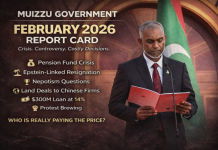Moody’s Maintained the Maldives’ credit rating at Caa2 with a negative outlook, signaling a troubling future for the nation’s economy and its people. The rating, which reflects the government’s ongoing struggles with external liquidity and substantial debt obligations, paints a grim picture of the country’s financial stability. This downgrade comes at a time when the Maldives faces mounting economic challenges under President Mohamed Muizzu’s government, raising questions about the administration’s competence and its ability to safeguard the nation’s financial future.
Moody’s report highlights the severe strain on the nation’s foreign exchange (FX) reserves, which remain alarmingly low, despite recent interventions like the currency swap agreement with India. While the Maldives was able to secure $400 million in US dollars and 30 billion Indian rupees through this agreement, it is clear that the country’s economic troubles are far from over. As of October 2024, the FX reserves were barely enough to cover 2 months of imports.
The situation is further exacerbated by the Maldives’ hefty external debt obligations, which will reach around $600-700 million in 2025, with a peak in 2026 when the $500 million sukuk bond matures. In simple terms, the government is facing a massive debt repayment crisis that could push the country towards default if it does not secure additional financing in the near future. This mounting debt burden highlights the glaring incompetence of Muizzu’s administration in managing the country’s finances and securing long-term economic stability.
For the average Maldivian, the consequences of this financial instability are already being felt. The government has implemented a range of measures aimed at increasing foreign currency inflows, such as new foreign exchange regulations for tourism operators and an increase in tourism-related taxes. However, these measures have not been enough to address the underlying economic problems. With the economy heavily reliant on imports, especially in the context of large public sector investment projects (PSIP) and capital spending, the Maldives continues to face widening current account deficits.
For everyday citizens, this translates into rising costs of living. Inflationary pressures, combined with a lack of local currency stability, threaten to erode purchasing power, particularly in the atolls where access to basic services remains limited. The increased taxes on tourism and goods will inevitably lead to higher prices for essential products and services, disproportionately affecting the common man who already struggles with high unemployment rates and limited opportunities outside of the capital, Malé.
The downgrade is a direct result of President Muizzu’s failure to effectively manage the nation’s fiscal policies. While the government has introduced measures to address the economic crisis, their implementation remains uncertain. There are serious concerns about the long-term effectiveness of these reforms, especially given the Maldives’ history of fiscal mismanagement and weak institutional structures.
The government’s inability to secure a comprehensive financing package to support the nation’s external liquidity needs further underscores its incompetency. With the clock ticking toward massive debt repayments in 2025 and 2026, the Maldives is running out of time to find a viable solution. Muizzu’s rhetoric about reforms and international relations may offer temporary relief, but without substantial and immediate action, the country risks a financial collapse.


















